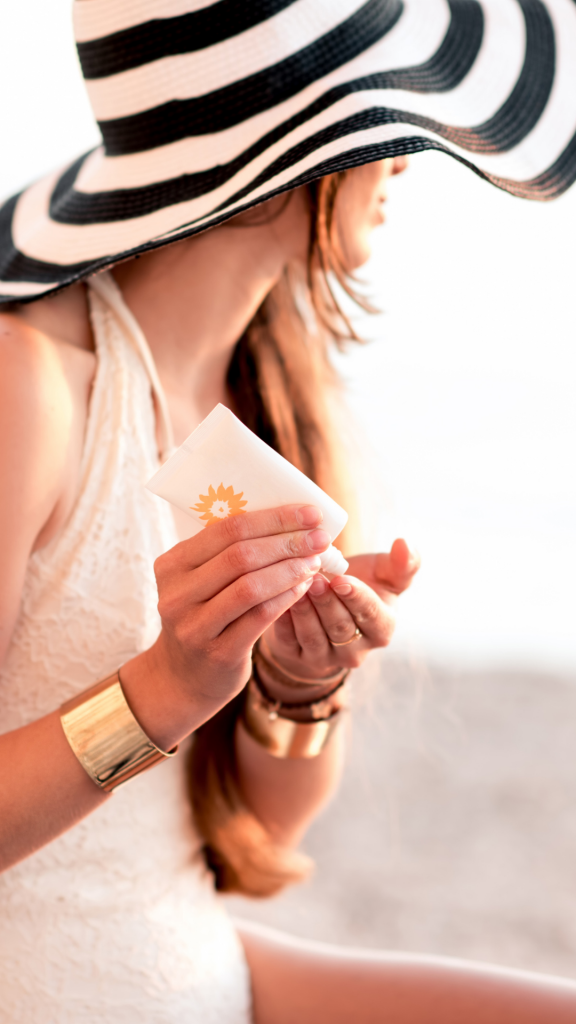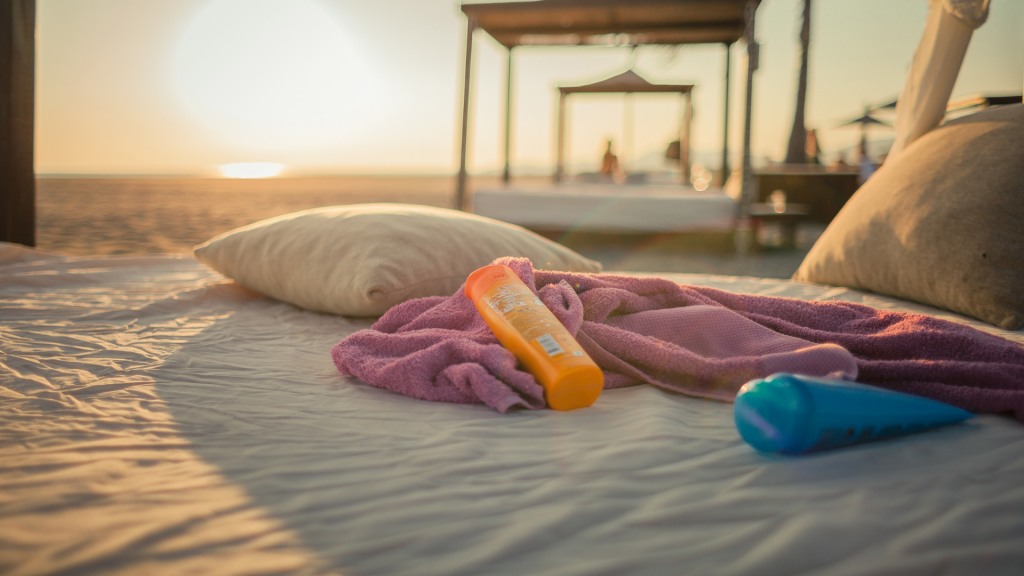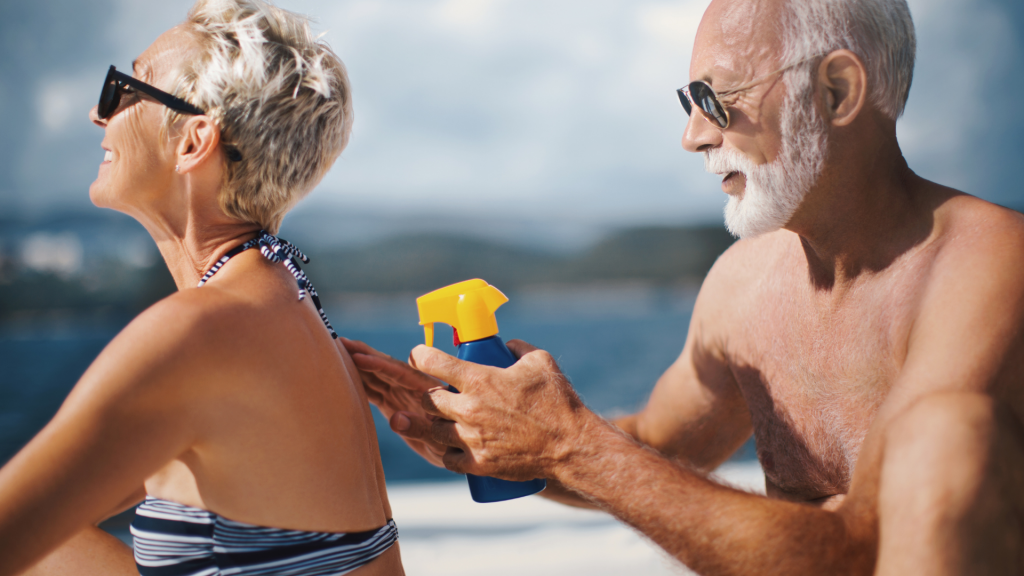Living in a subtropical Mediterranean climate is wonderful and comes with many positives, but there are also some less talked about negatives. What could possibly be negative about a warm climate and beautiful sunlight year round, you ask? Absolutely nothing, if it stayed that way, the tricky thing about the weather is – it changes.
The Mediterranean, fortunately, has a moderate and stable climate for most of the year. In summer however when temperatures and sun exposure peak, serious damage can be done to the skin, not just on those specific days, but permanently. Continued exposure over many years can accelerate skin aging, cause pigmentation problems, and lead to dermis diseases like skin cancer. When we consider skin is the body’s largest organ, with a lot of different tasks to perform across 100% of the body, keeping it healthy so it keeps us healthy is important.
With these risks in mind, how do we go about protecting our skin? When should we wear protection? What protection is best for fragile baby skin to fragile aging skin on beach days and every day? We wanted to know so we can better protect ourselves, our families, and of course, our clients living and moving to the Algarve and Portugal – so here is what we learned.
Sun Protection Products:
The saying, that not all things are created equal applies here. ‘Sunscreen’, ‘Sunblock, and ‘Sun Lotion’ are often used interchangeably and sound like they may do the same thing, but they don’t, and confusing them at the wrong time and place could put you at risk of damaging your skin.
Sunscreen:
Sunscreens tend to be chemical based and formulated to act as a filter to diffuse the sun’s ultraviolet UVA rays on the skin.
Sunscreens are typically formulated to penetrate the skin and use oxybenzone or avobenzone as their main active ingredients, along with other chemicals such as PABAs and sometimes insect repellants, perfumes, and essential oils.
These chemical ingredient combinations can be effective, but also create a problematic chemical cocktail for those with sensitive skin leading to a variety of irritations. They’re also not recommended for pregnant women and babies under 6 months, since they penetrate the skin layer, and little research is currently available on their long-term use.
Sunblock:
Sunblocks are considered physical and mineral based. They are formulated to reflect and block UVA and UVB rays from penetrating the skin.
Sunblock is typically formulated with titanium oxide or zinc oxide as the active ingredient. The titanium and zinc oxide is what cause the often seen white cast, and also increases their price. These tend to be thicker and require more attention when applied for proper coverage and protection. Newer formulas with tint and without the white cast are also coming on the market but these may be harder to find.
Pregnant women, babies 6months+, people with allergies, sensitive skin, or dermis type diseases are recommended to use these physical-based sunblocks to help create a layer of protection that sits on the skin, instead of the chemical-based sunscreens that penetrate into skin layers.
Sun Lotion:
Sun lotions can often be confused with sunscreens and sunblock – they are not the same. Confusing them could also leave you with sun-damaged skin if you’re not aware of the differences.
Sun lotions are designed to accelerate a tan. usually have an SPF of 15 or less and tend not to provide any protection.
Face Specific Protection:
When not at the beach face, lips, neck, ears, and hands are the most often sun-exposed areas for both men and women, with men also needing to consider their scalp. Women can often find sunscreen in their makeup, however, this may be at the level of a sun lotion and not offer enough protection for a sunny climate, especially if spending a lot of time outside.
Sun protection for the body can often feel too heavy for the face and under makeup, or offer the lovely white cast – that looks fine on the beach, but ghostly when in a meeting… Fortunately, here in Europe, a number of quality brands have started offering formations specifically targeted areas, and these are easily found in most pharmacies.
Dermatologist recommendations:
Armed with this new information we now know the best sunscreen option – depends. It depends on your specific skin type, so some research on your side and so not a one-size-fits-all solution. We also looked at dermatologist recommendations and most agree on the following:
- Sun Protection Factor (SPF) 30+
- Protection against both UVA and UVB
- Pregnant women & babies under 6 months should avoid chemical sunscreens
- Water-resistant
- Perfume and essential oil free
- Applied well and evenly on all exposed areas
- Check label for active and reapplication times
*If you have a skin condition your skin specialist should be able to guide you best.
Traveling with sunscreen.
Before buying sunscreen to travel consider where you’re destination’s options. Countries with different climates may have different sunscreen options, ingredients, and regulations.
If traveling internationally, your home country’s sunscreen may not have the best ingredients to protect you in the location you are visiting or moving to. Europe and the USA, for example, have different approved ingredients, and you may get access to better options when buying in the destination country.
Sun Cover:
Hot climate cultures find ways to manage heat and sun exposure. In the Algarve getting out of the sun during peak hours, 12:00-14:00 is common, especially during the summer months. Beach umbrellas, hats, sunglasses, and sunscreen are staples when at the beach. At home retractable awnings, gardens, and small windows with shutters are preferred.
Hydration:
Water. Skin loves water. If you can stay hydrated with good sun protection you’re not only quenching your thirst but helping your skin help itself to stay healthy and beautiful.
We love our sun here in the south and hope this has been helpful for you to feel better equipped to enjoy it too!










